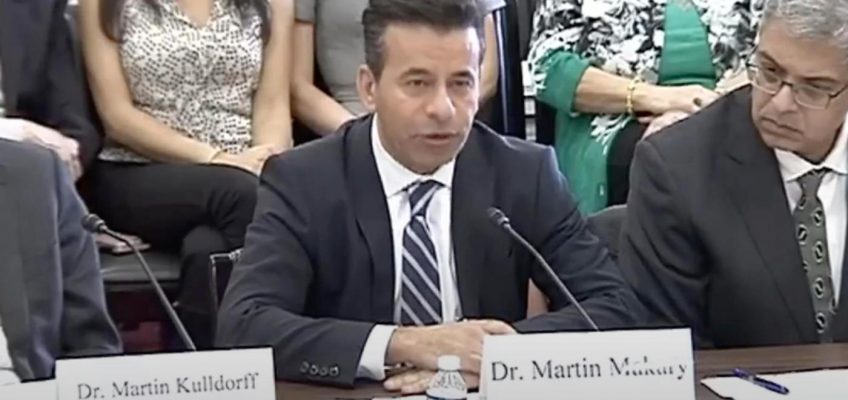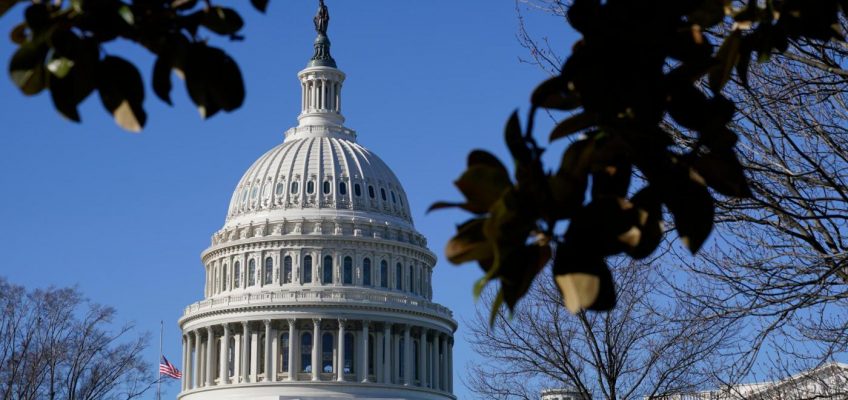By MATTHEW PERRONE
WASHINGTON (AP) — Dr. Marty Makary rose to national attention by skewering the medical establishment in books and papers and bashing the federal response to COVID-19 on TV.
A first-term Michigan senator is set to deliver the Democratic response to Trump’s speech
Census Bureau under Trump seeks permission to delete questions about gender identity
When is President Trump speaking today? Here’s how to watch
The White House talks tough on illegal immigration but ignores a key tool that could reduce it
Republicans target 4 ‘sanctuary’ cities as Trump pushes mass deportations
Now the Johns Hopkins University surgeon and researcher has been nominated to lead the Food and Drug Administration. The agency — responsible for regulating products ranging from toothpaste to vaccines — is famously understated, issuing carefully worded statements devoid of opinion or scientific speculation.
That’s the opposite approach of Makary, whose sweeping rhetoric and biting criticism often veer into hyperbole, according to a review of recent speeches, interviews and podcast appearances by The Associated Press.
Makary has called the U.S. food supply “poison,” says the federal government is the “greatest perpetrator of misinformation” about COVID-19 and regularly suggests that pesticides, fluoride and overuse of antibiotics may be to blame for rising rates of infertility, attention deficit disorder and other health conditions. He’ll appear Thursday before a Senate panel considering his nomination.
Makary’s views align with those of the man who would be his boss: Robert F. Kennedy Jr., the U.S. health secretary who built a following by sowing doubts about vaccines, ultraprocessed foods and fluoride. Notably, Makary has never embraced Kennedy’s discredited idea that vaccines might cause autism.
Experts who have worked with Makary say his contrarian approach could be useful at FDA — but only if he’s able to resist political pressure from Kennedy and others on hot-button issues like vaccines.
“He has this reputation of being someone who cares about evidence and transparency,” said Dr. Reshma Ramachandran of Yale University, who was part of an informal research group with Makary. “The question is whether he’s going to preserve and defend the integrity of the agency or is he going to fall in line with the administration.”
Makary did not respond to an AP interview request.
Makary reached a new audience on TV as a critic of COVID-19 measures
Trained as a pancreatic surgeon, Makary’s initial work focused on uncontroversial topics like hospital costs and surgical checklists.
In 2016, he made headlines with a paper stating that medical errors were “the third leading cause of death in the U.S.” That conclusion was quickly disputed by other experts, who said the paper’s death estimate was ten times higher than more rigorous reviews.
During the COVID-19 pandemic, Makary reached a much broader audience as a regular on Fox News, where he opposed vaccine mandates and called the FDA “broken” and “mired in politics and red tape.”
Makary often directs his harshest criticism toward the “medical hubris” of fellow doctors, as in his latest book “Blind Spots,” which catalogues a number of cases where experts “got the science perfectly backwards.”
For example, he examines early recommendations that parents delay giving babies peanut-based foods due to allergy risks. Today, pediatricians generally recommend earlier introduction to prevent food allergies.
Many researchers view such examples differently.
“These are cases of people doing the best they can with evolving information and needing to make decisions along the way,” said Dr. Aaron Kesselheim of Harvard Medical School. “As commissioner, he’s going to have to be OK with making decisions based on evolving evidence — and some of those decisions might be wrong.”
Tying health problems to food and pesticides
Like others in Kennedy’s “Make America Healthy Again” movement, Makary says many of the chronic health problems afflicting Americans may be related to food additives, pesticides and other chemicals.
“How about research on the pesticides that have hormone effects in children that may explain the declining fertility and lowering age of puberty?” Makary asked, in a September podcast with Dr. Drew Pinsky.
New York University food researcher Marion Nestle says Makary’s questions “are extremely difficult to settle,” because there’s no way to ethically do the type of research needed to reach a firm conclusion: give one group of children food with pesticides and compare them with a control group getting food not grown with pesticides.
“I sympathize with his frustration and think we would be much better off with a lot fewer pesticides in our food supply, but I tend to view these issues more cautiously,” Nestle said.
Nutrition experts also say it’s overly simplistic to declare all ultraprocessed foods harmful, since the category includes an estimated 60% of U.S. foods, including granola, peanut butter and ice cream.
“They are not all created equal,” said Gabby Headrick of George Washington University. “It is much more complicated than just pointing the finger at ultraprocessed foods as the driver of chronic disease in the United States.”
Attacking COVID-19 boosters
“The greatest perpetrator of misinformation during the pandemic has been the United States government,” Makary told House lawmakers during a 2023 roundtable hosted by Republicans.
Among the many COVID-19 policies Makary attacked was the recommendation for booster shots in teens and young adults, particularly boys and young men. That group received particular attention because early vaccinations showed a higher rate of myocarditis, a rare form of heart inflammation that is usually mild. Complicating the issue was the fact that COVID-19 itself also caused cases of myocarditis that were usually more severe.
A 2022 paper coauthored by Makary concluded that requiring booster shots in young people would cause more injury than benefit. None of the authors specialized in studying infectious diseases or vaccine reactions.
“They made mistake after mistake and every time it either minimized the vaccine’s benefits or exaggerated the risks,” said Dr. Robert Morris of the University of Washington, who published a critique of the work. “This paper really fed the whole notion that the vaccine is worse than the disease.”
Makary’s conclusion contradicted that of U.K. experts and the Centers for Disease Control and Prevention, which estimated the booster prevented 114 hospitalizations for every seven it caused in young people.
Despite such pushback, Makary told Congress that CDC and FDA “lied to the American people” about the need for boosters and other COVID measures.
Dr. Paul Offit, an FDA vaccine adviser, says the Biden administration made missteps in rolling out boosters, including announcing plans to make them available for all age groups before outside experts had weighed in. But, Offit said, Makary’s language has damaged public trust in health institutions, including the one he’s been picked to lead.
“It’s rhetoric that’s purposefully inflammatory to win over a certain crowd, which is part of today’s zeitgeist of disdaining public health agencies,” Offit said. “So he’s offered the position at FDA because he has disdain for the agency.”
AP Medical Writer Lauran Neergaard contributed to this story.
The Associated Press Health and Science Department receives support from the Howard Hughes Medical Institute’s Science and Educational Media Group and the Robert Wood Johnson Foundation. The AP is solely responsible for all content.




